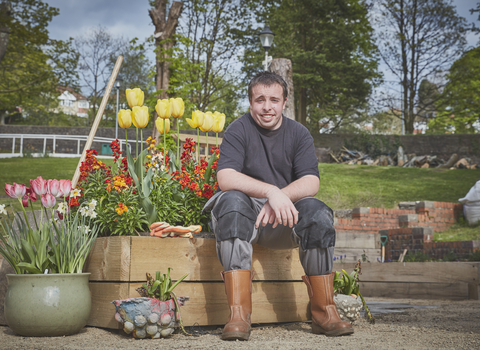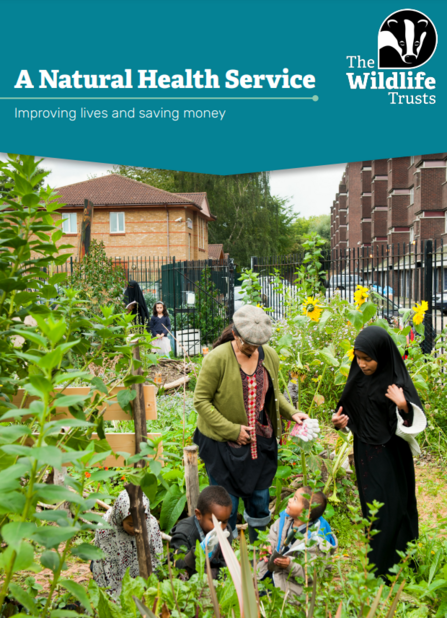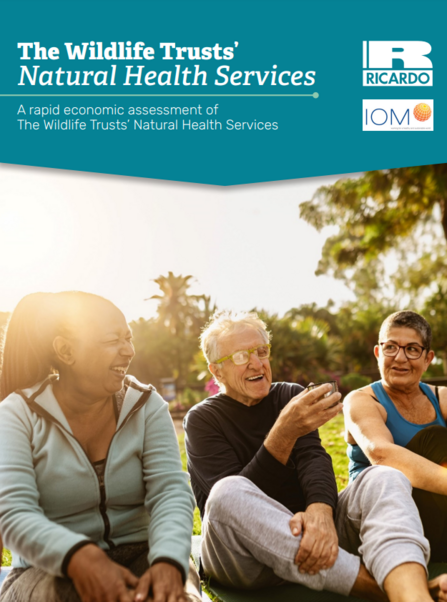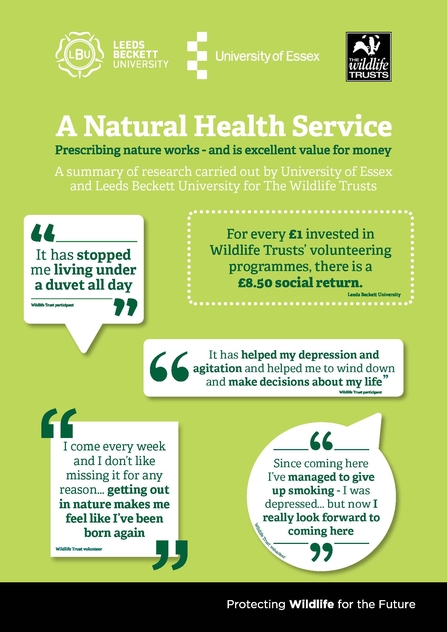The natural world is the foundation of our health, well-being and prosperity
Evidence shows that a thriving, wildlife-rich environment benefits both physical and mental health. People with nature on their doorstep are more active, mentally resilient and have better all-round health. However, just 35% of households with annual incomes below £10,000 are within a 10-minute walk of a publicly accessible natural green space.
This is why The Wildlife Trusts are working to bring wildlife to more people, and more people to wildlife.
The Wildlife Trusts' health and well-being programmes near you have also been shown to save the NHS money and cut reliance on their resources. With the NHS under unprecedented pressure, it has never been more important that Wildlife Trusts reach more people, delivering proven health and well-being gains.
What The Wildlife Trusts are doing
Helping people and their neighbourhoods thrive
People’s health and well-being is improved by ensuring there are easily accessible wildlife-rich natural spaces where they live and work. This is particularly important where access to nature is poorest, and pressure on health services is greatest. The condition our neighbourhoods are in directly affects how long people will live, and the quality of their lives. Issues like air quality, the impacts of climate change and how much nature we can enjoy on our doorsteps all impact on our health.
Increasing people’s well-being and preventing illness
Wildlife Trust volunteering programmes provide twin benefits:
- They provide health benefits to those taking part;
- The local population benefit from having wildlife-rich spaces on their doorstep.
The body of research into the impact of volunteering with The Wildlife Trusts shows that engaging with nature promotes well-being and prevents mental illness from developing or getting worse. A social return of £8.50 for every £1 invested in Wildlife Trust volunteering programmes strengthens the argument for a community-based approach to health.
We also work with communities through programmes like Nextdoor Nature listening to what people want to change about where they live and work, and where their children play. The Wildlife Trusts support them to take positive action to make those changes: for wildlife, for their health and their happiness.
Delivering health and well-being programmes
The Wildlife Trusts deliver targeted projects and programmes that provide benefits to people faced with health inequity, including those with restricted mobility, older people, carers, and those who are economically inactive. In addition to improving peoples’ physical, emotional and mental well-being, there is a clear cost-benefit to the NHS, and therefore to wider society. We help prevent unnecessary ill health and reduce the number of people requiring NHS services.
What excites me about this research is that it shows the potential of Wildlife Trusts programmes to work alongside and reduce reliance on NHS services. Programmes that tackle some of the causes of preventable illnesses: social isolation that can lead to feelings of loneliness or depression, and physical inactivity.GP, vice-president of The Wildlife Trusts
How local Wildlife Trusts can help
Explore the map below to see well-being programmes near you.
Key

Well-being project
Case Study: Connor Green - Gwent Wildlife Trust
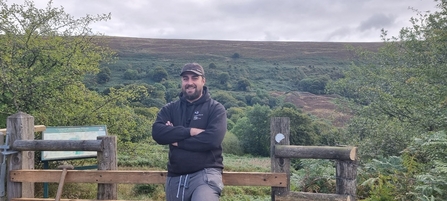
Liz Winstanley
Connor Green was referred to Gwent Wildlife Trust’s Wild Health project through the GP referral scheme. He took part in numerous sessions, which fostered a deeper curiosity in nature and wildlife. He has since shadowed delivery staff, co-delivered sessions, delivered sessions and gone on to attain volunteer warden status at Silent Valley Nature Reserve SSSI for Gwent Wildlife Trust. Acting as a visible presence on site, dealing with queries from members of the public, and undertaking surveys and site security checks, his achievements have been nothing short of remarkable. He has also undertaken a plethora of training to enhance his personal and professional development including animal husbandry, strimmer and brushcutter, ATV sit astride and first aid in an outdoor setting.
He has amassed hundreds of voluntary hours for Gwent Wildlife Trust and Local Authority Countryside Teams.
What people are telling us
"That feeling of connection to something much greater than myself; nature’s ability to keep going despite all we throw at it; the beautiful sights, sounds, smells and feel of nature." - 2024 X follower
"I don't know why my state of mind be without the sea and the flowers." - 2024 Instagram follower
"30 years of working in the NHS and so being outside, hearing the birds and smelling the trees is my therapy. I can’t imagine being in a world without wildlife and animals thank you for caring." - 2024 Instagram follower
"I don't think I would have been sane after COVID without nature. Being in nature is my safe place, where I feel at peace." - 2024 Instagram follower
"My deep connection to nature has helped me countless times, through big events like grief and Covid but also with those everyday feelings of loneliness I used to have." - 2024 Instagram follower
What we're calling for
Natural Health Services in every community
It is clear that when other organisations work alongside the NHS, illnesses caused by social factors like loneliness and physical and economic inactivity can be prevented.
A ‘Natural Health Service’ alongside the creation of natural spaces in communities across the country will result in healthy and sustainable places to live and work. It makes economic sense and has the potential to deliver improved health and well-being at a population level.
Wildlife Trusts programmes make economic sense and have the potential to deliver improved health and well-being at a population level. These need to be made available to more people in more places, to help prevent unnecessary ill health and reduce the number of people requiring NHS services.
- Independent economic analysis (July 2023) found that Wildlife Trusts' health and well-being programmes save the NHS money and cut reliance on their resources. An investment of £5.34 million would enable The Wildlife Trusts to improve the mental health and well-being of 1.2 million people, saving the NHS £635.6 million.
The Wildlife Trusts and other organisations in the environment, creative arts, sport and physical activity sectors delivering ‘social prescribing’ must be integrated into health and social care services in the community. This has the potential to deliver improved health and well-being at scale. Policies that enable shared investment from government departments that are concerned with housing, employment, community cohesion, transport and culture would create the ‘engine room’ for community-based health services and would also enable private, public and philanthropic investment at a local level.
A right to a healthy natural environment
The Covid-19 pandemic showed that natural spaces were a lifeline to thousands. A new law that creates a human right to a clean and healthy environment for all would safeguard this, and the health and well-being of generations to come. Making a healthy environment a legal right would lead to people shaping local spaces to their own needs and circumstances. Local Authorities would then be able to support communities by helping them to protect these spaces, and creating access to nature where it is needed the most.
Give every child the best start in life - naturally
The opportunity to learn outdoors is transformational for children. Learning in high-quality green or blue spaces equalises access to nature, giving young people the chance to experience the natural world around them. Outdoor learning benefits children’s mental health and embeds a feeling of responsibility to look after the environment. Direct experiences like these stay with us into adulthood and shape the way we live. New statutory guidance to deliver outdoor education for all can ensure our schools support happier, more confident children who understand their impact on our natural world, carrying this through into their working lives.
If Wildlife Trusts programmes like those described in this research were made available to more people in more places, they could help prevent unnecessary ill-health and reduce the number of people requiring NHS services.UCL Institute of Health Equity
A Natural Approach to Health Works
Global environmental consultancy Ricardo and The Institute of Occupational Medicine carried out an economic assessment of Wildlife Trust-led programmes, to investigate if there were any benefits to the NHS and calculate any cost savings. The analysis showed that Wildlife Trusts' health and well-being programmes save the NHS money and cut reliance on their resources. Furthermore, it showed much greater cost savings if these programmes were delivered at scale across the UK.
If just one of the programmes analysed was offered across the UK, reaching 1.2 million people, it could result in annual cost savings of £635.6 million.


